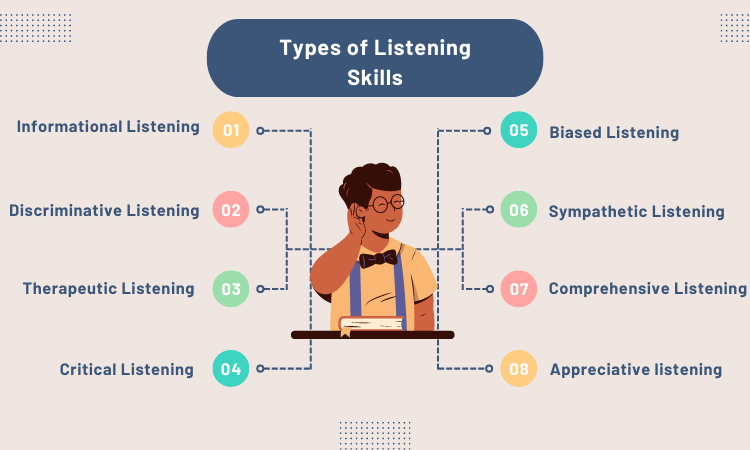Listening is the ability to receive and evaluate messages during a conversation accurately.
Effective communication necessitates the ability to listen. Messages are easily misread if you don't know how to listen well. As a result, communication breaks down, and the message sender may become disappointed or irritated.
Listening is the one communication ability that will serve us well throughout our lives, and it is one that everyone should aspire to master.
Customers' happiness, increased productivity with fewer errors, and improved information interchange is all factors that can contribute to more creative and innovative work.

Some of the reasons why it is critical are as follows.
- It improves business relationships by fostering trust, eliminating misconceptions, and assisting in conflict resolution.
- It boosts worker productivity.
- It facilitates the acquisition of new information.
- It contributes to the development of leadership skills.
You must ask why listening is so crucial in life and work?
It's crucial to comprehend what other people are attempting to express. It's simple to get something wrong and make assumptions if you don't listen.
When you actively listen, on the other hand, you may genuinely communicate with someone else.
Listening is the most critical component of communication. It aids in the formulation of a solid and meaningful response. You can pick up on details others might miss, especially concerning body language.
8 Types of Listening Skills
1. Informational Listening

You're conducting informed listening when you listen to learn something. Daily, it happens to everyone. Informed listening can occur in various settings, including school and work, when you hear the news, watch a documentary, or when a friend tells you about their day.
When we listen to learn or be informed, we take in new information and facts; we are not criticising or analysing. It is sometimes accompanied by note-taking, particularly in formal business meetings or school settings. Note-taking is a method of preserving vital information to review it later.
2. Discriminative Listening

Humans are born with the ability to listen selectively.
This form of hearing is what we do before we even know how to understand words. Discriminative listening relies on the tone of voice, verbal signals, and other sound alterations rather than words.
Before they can grasp words, newborns use discriminative hearing to figure out what a phrase means.
They will smile and laugh back if someone speaks to them in a cheerful and delighted tone. They can also know who is speaking because distinct voices are recognised. On the other hand, discriminative listening isn't just for babies.
If you're listening to a conversation in a foreign language, you'll probably certainly use your discriminative listening skills. By analysing tone and inflexion, you'll be able to figure out what's happening.
Listening and evaluating can also be done using nonverbal cues. For example, facial expressions, body language, and other behaviours can tell a lot about a communication's meaning.
For example, if you meet up with a friend who is typically full of energy, their voice suddenly becomes downcast or sorrowful. You use your discriminative listening abilities to figure out if the person has a problem in this situation.
3. Empathetic or Therapeutic Listening

Empathic listening entails seeking to comprehend the speaker's feelings and emotions — putting yourself in their shoes and sharing their thoughts.
Empathy is a method of feeling intimately connected to another person, and therapeutic or empathic listening can be challenging.
Using this listening, you can try to understand someone else's point of view while speaking. You might also try to put yourself in the other person's shoes.
You can use sympathetic listening to relate to someone else's experiences as if they were your own, rather than only focusing on their message.
Example: Counselors, therapists, and other professionals employ therapeutic or empathic listening to understand their clients better and, eventually, help them. This form of listening involves gently urging the speaker to clarify and expound on their experiences and emotions rather than making judgments or offering advice.
4. Critical Listening

If you need to analyse complex data, you'll need to practise critical listening.
Critical thinking while listening is more in-depth than passive listening. When it comes to problem-solving at work, it is critical.
For example, you might use this listening technique when considering how to address an unusual and complicated client request.
This is an excellent ability to acquire for business meetings, financial transactions, and any other high-stress occasion.
We can learn to reach a judgement much faster and more readily by absorbing the most important information from what someone says.
When listening critically, keeping an open mind and avoiding being swayed by prejudices or prior notions is crucial. You will improve your listening skills and extend your understanding and perception of other people and your relationships as a result of this.
5. Biased Listening

When someone employs biassed hearing, they will only listen for information they want to hear.
This listening process has the potential to skew information. That's because the listener isn't tuned in to what the speaker is trying to say.
You may have a selective hearing if you regularly drop out of discussions.
People who listen selectively or biasedly must make an effort to focus on what is being said, especially during important occasions such as work meetings, job interviews, and times when close friends or family members confide in you about something personal or unpleasant.
6. Sympathetic Listening

Sympathetic listening is fueled by emotion. Rather than the message conveyed through words, the listener focuses on the speaker's feelings and emotions. This is done to assist you in working through your emotions and sentiments.
Using sympathetic listening, you can provide the aid that the speaker requires. The speaker will feel heard and affirmed if you pay attention in this manner. To develop a deeper relationship with someone in your life, you must listen sympathetically.
Example: Let's imagine you happen to run into a classmate in your class. Because they look to be distressed, you decide to pay attention to what they have to say.
7. Comprehensive Listening

Language abilities are required for unlimited listening. It's the polar opposite of discriminative listening. Early childhood is when this type of hearing develops.
People employ comprehensive listening to comprehend what is being said in words.
It is the foundation for several other forms of listening. For example, you must use thorough listening to employ informational listening and learn anything new.
To decipher the messages others send you at work and in your personal life, You'll need to utilise a mix of comprehensive and discriminative listening techniques.
Simply put, complete listening requires absorbing the message's relevance. It will use a range of analyses and judgments to interpret the speaker's statement. It would help if you broadened your horizons to comprehend or understand the person entirely.
Example: If you ask someone if taking health insurance is a beneficiary or not, there are two people with polar opposite responses. i.e. one says it helps, and another one says it doesn't. Now it's upto the questioner to comprehend and analyse their circumstances.
8. Appreciative listening

Appreciative listening is defined as genuinely enjoying what the speaker is saying.
It's a style of listening in which you give the speaker your full attention because you're personally invested in what they're saying and how they're saying it.
In this listening, a person expresses gratitude to others for helping them meet a need. People use appreciative listening to enjoy wonderful music, meditate, attend seminars, read poetry, listen to audiobooks, and listen to a lecture.
Wrap Up
We have tried to note down all, but still, these are only a few instances of different types of listening. After all, condensing human nature into a single piece is difficult!
All kinds of listening have their place in our lives, but it's helpful to know which ones we should practise and which we should avoid.
Since you have read the article and gathered information, you can quickly examine your favourite way of communication.






